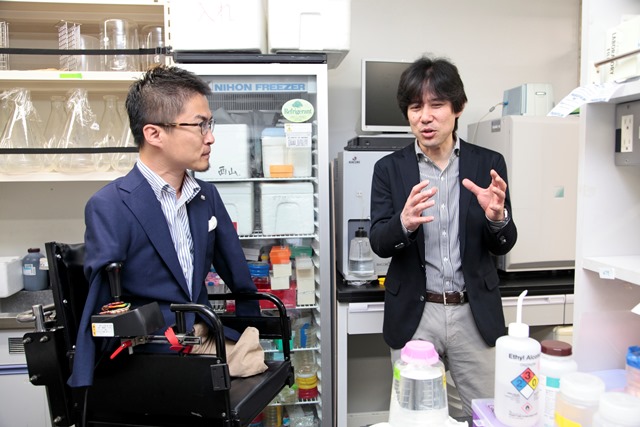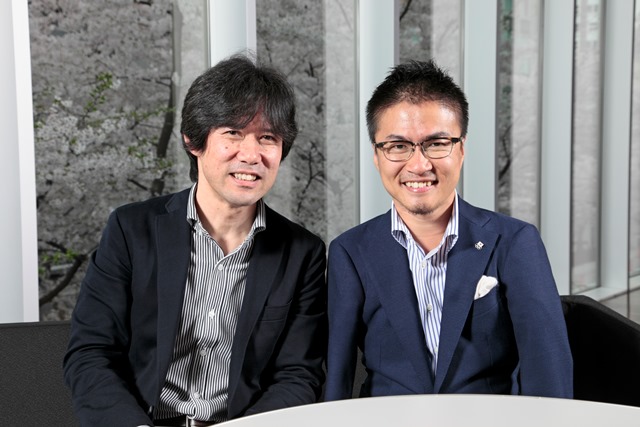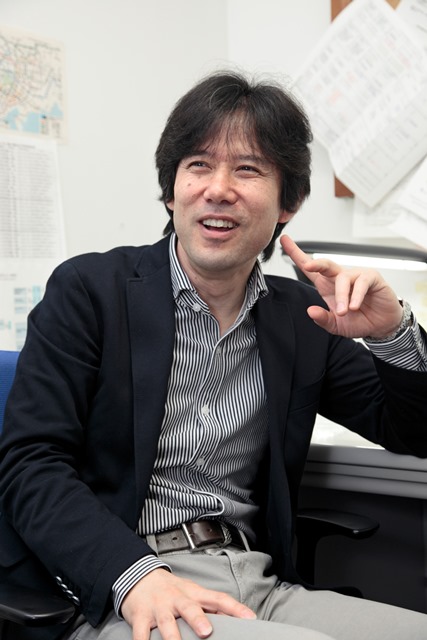Waseda Frontline Research Vol.1, Part 3 – Changing the world with innovative research
Fri, Jul 24, 2015-
Tags
Epigenetics pioneer Hitoshi Kurumizaka unravels the mystery of the body of author Hirotada Ototake
Changing the world with innovative research

Mr. Hirotada Ototake visiting the Kurumizaka Research Lab at the Waseda University Center for Advanced Biomedical Sciences (TWIns)
Epigenetics is expected to revolutionize the treatment of genetic disorders that have posed immense challenges for human beings. However, innovation always comes with advantages and disadvantages. How should we think about this new blueprint for life going into the future? Below is part two of the conversation between author of No One’s Perfect Mr. Hirotada Ototake and Professor Hitoshi Kurumizaka.
“It is the goodness of people that pushes humanity forward. This is what scientists believe.” (Kurumizaka)
Ototake: I would like to ask you about the social significance of research and innovation. For example, the creation of mobile phone technology was a remarkable accomplishment. However, if technology is developed without considering the disadvantages, it might lead to negative trends within society, say for example how bullying has become more serious among children who use mobile devices.
If technology that beats cancer is produced and proliferated, it may extend the average lifespan of Japanese people. This development could lead to even more pressure on our country’s already strained finances. Suppose that for the sake of Japanese society, you decided to make this technology inaccessible. Is such a thing even possible?

Kurumizaka: If you want to seal off a technology you’ve discovered, it’s simple: just don’t to use it. But the thing is if you announced your discovery in journals, at academic conferences and with patents, the technology becomes public. We can choose not to use it ourselves, but we do not have the right to restrict it from others.
Listening to what you have just said, I am reminded of the more frightening aspects of the internet. Of course, the internet is a wonderful tool. However, because it has progressed so quickly and spread so dramatically, the human brain can no longer keep up. As a result, we are seeing many new issues arise from the internet, such as mental illnesses and criminal activities. What if technology progressed to the point where we could no longer keep up? It’s very important for us to think about these issues.
Ototake: It’s the same with the internet and nuclear power. Until now, human beings have been leading advancements in science and technology. However, because of these major advancements it appears as if science is leaving human beings behind in certain respects.
Kurumizaka: It is not good for science to keep discoveries secret from the public. There are people who would use new discoveries for bad purposes, but they are outnumbered by those who would use them for good. It will be those with good intentions that allow humanity to progress. It may be that we researchers cannot hope to exist unless we believe in the goodness of humankind. Perhaps this is the role we are expected to play in society.
“The Nobel Prize is not something you can plan to win – that’s why it’s so precious. It would be an enormous honor to receive it someday.” (Kurumizaka)
Ototake: May I ask you one last question? What does the Nobel Prize mean to a researcher?
Kurumizaka: It’s the ultimate honor. If I received the award, went to Stockholm with my wife, attended the ceremony, and if all members of my lab and graduates threw a party to celebrate, I’d be so happy I wouldn’t care if I dropped dead on the spot.
But then again, this is only a dream, an aspiration. There may be people who conduct research because they want a Nobel Prize, but in my view, the Nobel Prize is precious because it’s given to people who have made a significant contribution to mankind. Therefore, first and foremost, our goal should be to make a significant contribution. I believe Dr. Shinya Yamanaka’s press conference when he received the Nobel Prize reflects this view. Since I work in a research field that is relatively close to his, I cried when I heard the news and wanted to congratulate him from the bottom of my heart. After hearing what he said at the press conference, I was determined to continue working as a researcher.
Ototake: It was very nice meeting you today and hearing you discuss your field of research that we do not get to see in our everyday lives. I had a wonderful time and learned a lot. Thank you so much.

Mr. Hirotada Ototake and Professor Kurumizaka
Profile of our guest
Hirotada Ototake
Born April 6, 1976, in Tokyo. While a student at Waseda University, he published No One’s Perfect, a book about his personal experiences written with a touch of humor. It instantly won the hearts of readers and became a major hit, selling more than 5 million copies. Later, he worked as a TV newscaster and became a successful sportswriter.
In April 2005, he launched a career in education, hired by the Shinjuku Board of Education in Tokyo to teach children about life. He later became a regular teacher at Suginami Fourth Elementary, a public school in Tokyo, and was appointed to the Tokyo Metropolitan Board of Education. His first novel Daijoubu Class 3 (English title: Nobody’s Perfect), about his experiences as an elementary school teacher, was made into a movie, with Ototake playing himself. He wrote a sequel to the novel, Arigato Class 3 (“Thank you, Class 3”). His other books include Dakara Boku wa Gakko e Iku (“That’s why I go to school”), Oto Kotoba (“Ototake’s words”), and Ototake Sensei No Mittsuno Jugyo (“Mr. Ototake’s three lessons”).
In April 2015, he enrolled in a Master’s program in public policy at the National Graduate Institute for Policy Studies (GRIPS).
Profile

Hitoshi Kurumizaka
1989: Graduated from the School of Pharmacy, the Tokyo University of Pharmacy and Life Sciences; licensed pharmacist.
1995: Completed Ph.D. at the Graduate School of Science and Engineering, Saitama University.
1995–1997: Postdoctoral Fellow, US National Institutes of Health (NIH).
1997–2003: Researcher, RIKEN.
2003–2007: Assistant Professor, Department of Electrical Engineering and Bioscience, Faculty of Science and Engineering, Waseda University.
2001–2007: Visiting Associate Professor, Department of Science of Biological Supramolecular Systems, Graduate School of Integrated Science, Yokohama City University.
2007–2008: Associate Professor, Department of Electrical Engineering and Bioscience, School of Advanced Science and Engineering, Waseda University.
2008–2012: Visiting Professor, Graduate School of Integrated Science, Yokohama City University.
2003–2015: Visiting Researcher, RIKEN.
2012 to present: Guest Professor, Graduate School of Medical Life Science, Yokohama City University.
2008 to present: Professor, Department of Electrical Engineering and Bioscience, School of Advanced Science and Engineering, Waseda University.













